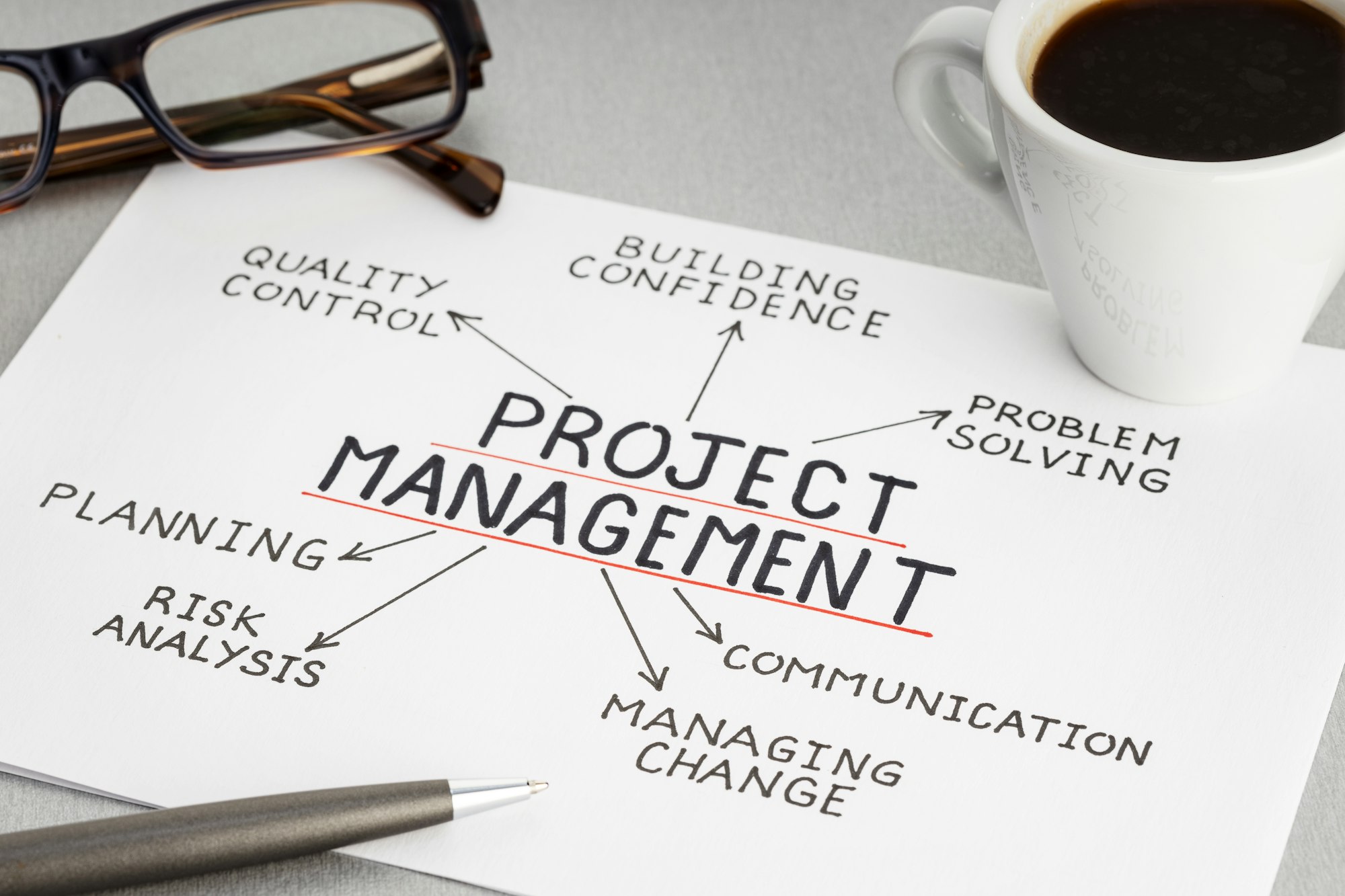
Effective project cost estimation and management are the cornerstones of any successful project. Without them, even the best-laid plans can go awry.
Picture this: you’re guiding your team through a complex project with numerous variables and moving parts. How do you ensure that everything stays on track, under budget, and within scope? The answer lies in utilizing the right tools.
These tools help streamline processes, provide accurate estimates, and keep your finances in check.
“Plan your work and work your plan.” – Napoleon Hill
In this article, we’ll delve into some of the essential tools that can transform the way you manage project costs. From sophisticated software to simple techniques, these tools will equip you with the insights and capabilities needed to stay on top of your project’s financial health.
Let’s explore how you can use these tools to turn your project management challenges into success stories.

Accurate project cost estimation is crucial for the success of any project. Fortunately, there are several sophisticated tools available that can streamline the complex process of cost estimation.
ProjectManager is a versatile tool designed for comprehensive project management, including cost estimation. Its dashboard provides real-time cost metrics and powerful reporting features, ensuring you stay on top of your budget.
Procore is an excellent choice for construction projects, offering functionalities that help create accurate estimates and monitor costs throughout the project’s execution. With its integration features, it seamlessly aligns with existing workflows.
For detailed project cost tracking and reporting, ClearView provides a robust platform that supports everything from initial estimation phases to final project closeout, making it easier to manage finances effectively.
If you are looking for a more customizable approach, spreadsheet-based tools like Microsoft Excel can also be highly effective. With pre-built templates available, you can create tailored and detailed cost estimation sheets that suit your specific project needs.
These tools can make your cost estimation process smoother and more accurate, ultimately leading to the successful delivery of your projects within budget.

When it comes to project cost estimation, having reliable project management tools can make a world of difference. These tools not only help in estimating costs accurately but also in ensuring that the project stays within budget throughout its lifecycle.
Cloud-based project management tools are a game-changer for cost estimation. They allow you to access your data anytime, anywhere, and collaborate with your team in real-time. This ensures that all stakeholders are on the same page, reducing the chances of miscommunication and errors.
Gantt charts are essential for visualizing project timelines and understanding how different tasks and phases interconnect. They provide a clear overview of when costs will be incurred, helping you plan your budget step-by-step.
Features like integrated task management and project reporting tools are vital. They enable you to assign tasks, monitor progress, and generate detailed reports. These insights help you identify any deviations from the planned budget early on, allowing for timely adjustments.
Effective resource management helps ensure that your project is neither overstaffed nor understaffed, which can significantly affect costs.
Tools that offer resource allocation and tracking functionalities provide a detailed picture of resource utilization, making it easier to manage associated costs.
Using these project management tools effectively can significantly enhance your cost estimation process, ensuring that your projects are completed within budget and on time.
Ultimately, they provide you with the data and insights necessary to make informed decisions, helping you steer your project towards success.

Effectively managing project costs is crucial for ensuring the timely and successful completion of any project. Streamlined project cost management software offers robust solutions to help you stay within your budget and monitor expenses effortlessly.
ProjectManager: This dynamic tool is immensely beneficial, particularly for large construction projects. It not only helps in creating and organizing all associated costs but also provides secure timesheets, impactful resource management, and task management features.
Additionally, its dashboard delivers real-time cost metrics alongside powerful reporting features that can greatly enhance your project’s financial efficiency.
CoConstruct: CoConstruct is another excellent choice, particularly tailored for construction projects. It offers seamless integration with systems like ComputerEase, delivering an all-in-one platform for estimating, accounting, and project management. Using CoConstruct helps in streamlining workflows, reducing manual data entry, and minimizing errors.
Investing in the right project cost management software not only supports expense tracking but also enhances overall project productivity and efficiency.
These tools are designed to cater to the unique needs of various industries, particularly construction, by combining essential features such as budget tracking, real-time updates, and comprehensive reporting into a single, user-friendly interface.

Despite all the advanced features and integration capabilities, the true potential of cost estimation software can only be realized through best practices. Here are some essential tips to keep your project on track:
Ensure that your cost data is always current. Prices of materials, labor, and other resources can fluctuate, and using outdated information can lead to significant discrepancies in your estimates and budgeting. Utilize software features that allow real-time updates or easy importing of new data.
Most cost estimation software provides pre-built templates tailored to various industries or project types. Take advantage of these templates to streamline the estimation process. Additionally, customize them to better fit the specifics of your project. This not only saves time but also enhances the accuracy of your estimates.
To maximize efficiency, integrate your cost estimation software with other project management and accounting systems. This seamless connectivity ensures a smooth data flow, reducing manual entries and the risk of errors. It also provides a comprehensive view of project finances, improving decision-making.
Projects are dynamic, and various factors can alter initial conditions. Schedule regular reviews of your cost estimates and adjust them as necessary. This practice helps in staying aligned with the project’s actual progress and financials, helping you manage contingencies more effectively.
Even the most advanced tools require skilled users. Invest in training your team on how to use the software effectively. This includes understanding the features, shortcuts, and best practices for accurate cost estimation. A well-trained team can significantly improve the software’s ROI.
Most cost estimation software comes with robust reporting functionalities. Use these tools to generate detailed reports on cost breakdowns, variances, and forecasts. Sharing these reports with stakeholders keeps everyone informed and fosters transparency, which is crucial for project success.
By following these best practices, you can fully leverage the potential of your cost estimation software, ensuring accurate, efficient, and transparent project cost management.

Integrating cost management software with your existing systems can transform how you handle project finances. By leveraging compatible tools, you can ensure smoother workflows and real-time data accuracy, helping you make informed decisions at every project phase.
One critical aspect is compatibility. The software you choose should seamlessly extract and export data, integrating effortlessly with other construction tools and software systems.
For instance, CMiC allows efficient tracking and management of actual costs against estimated budgets, streamlining your financial planning and reporting.
Using solutions like ComputerEase, you gain an all-in-one platform that combines estimating, accounting, and project management. This integration eliminates data silos, ensuring every team member accesses up-to-date financial information.
Another example is integrating third-party financial software with Salesforce. This allows for comprehensive financial tracking within your CRM environment, aiding in higher accuracy and better forecasting.
Similarly, ProEst connections with industry-specific tools provide a seamless experience, from bid estimation to final project wrap-up.
Consider spreadsheet-based tools if you need a less complex, yet effective solution. These can often be easily synchronized with larger cost management software, offering flexibility in data handling.
Moreover, integration with bookkeeping and accounting software like MYOB helps protect profit margins and keep projects on track. Ensuring your software offers user-friendly interfaces and precise calculations is crucial for maximizing efficiency and minimizing errors.
In summary, the right integrations create a unified environment where real-time data and streamlined processes contribute to successful project cost management. Choose wisely, and your projects will not only stay on budget but thrive with enhanced financial oversight.

Underestimating project costs can lead to significant setbacks, undue stress, and a loss of credibility for both you and your team. Here are some common pitfalls to watch out for and tips on how to avoid them to ensure accurate and reliable cost estimations:
One of the most frequent errors in cost estimation is poor scope definition. When the project scope is not clearly defined, it can lead to numerous unforeseen expenditures.
To avoid this, ensure that the project requirements are clearly outlined from the outset. Conduct thorough stakeholder interviews and make sure all aspects of the project are documented in detail.
Relying on incomplete cost data can cause major discrepancies in your final cost estimates. It’s essential to gather comprehensive historical data, benchmark data, and consult with experts to ensure all potential costs are considered. Employing detailed cost estimation templates can also help in capturing all necessary elements.
Failure to account for risks can be devastating to your budget. Include a risk contingency in your cost estimates to accommodate potential uncertainties and unforeseen circumstances.
Utilize risk management tools to identify possible risks and quantify their impact on the project. This approach not only helps in covering unexpected costs but also ensures more realistic budgeting.
Misjudging the resources required for a project leads to budget overruns and delays. It’s critical to have a robust resource management strategy that includes labor, materials, and equipment.
Make sure to use resource management tools that provide visibility into resource allocation and real-time updates on resource availability.
Economic conditions, material costs, and labor rates can fluctuate, impacting project budgets significantly. Stay updated on market trends and incorporate potential changes into your cost estimates.
Engaging with suppliers and contractors early in the planning stage can also provide insight into future price changes.
Lack of communication between project stakeholders can lead to missed details and inaccurate estimates. Foster an environment where open communication is encouraged.
Utilize collaboration tools that facilitate easy sharing of information, updates, and feedback among team members and stakeholders.
By recognizing and addressing these common pitfalls, you can enhance the accuracy of your project cost estimations and mitigate the risks associated with budget overruns.
Remember, a well-thought-out estimate not only acts as a financial roadmap but also forms the foundation for successful project execution.

One of the often overlooked benefits of cost management tools is their ability to foster and enhance team collaboration. When team members have access to real-time data and a shared platform for managing costs, it creates a more cohesive and informed workflow.
This not only streamlines communication but also ensures everyone is on the same page regarding budgeting and expenses.
ProjectManager, for instance, offers a feature-rich environment where teams can view construction project budgets and track costs from multiple perspectives.
This flexibility allows different departments—such as finance, procurement, and operations—to connect seamlessly, fostering collaboration whether they’re in the office or on-site.
The integrated dashboard delivers real-time cost metrics and powerful reporting features, making it easier to make informed decisions collectively.
Moreover, tools like CMiC and ComputerEase provide an all-in-one solution that combines estimating, accounting, and project management.
This integration reduces the need for constant back-and-forth communication, thereby expediting the project timeline. Team members can review cost reports, discuss budget adjustments, and plan accordingly without ever leaving the platform.
Additionally, these tools often come with communication features such as in-app chat or comment sections on specific tasks. This facilitates instantaneous feedback and discussions, helping to resolve queries and issues promptly.
By centralizing all the essential data and communication channels, cost management tools eliminate silos, allowing for a more transparent and collaborative environment.
Ultimately, enhancing your team’s collaboration with top-notch cost management tools can significantly contribute to project success. This unified approach ensures that everyone from team members to stakeholders is well-informed and engaged, enabling smoother execution and better financial outcomes.

As technology relentlessly evolves, project cost management tools are becoming more sophisticated, accurate, and user-friendly. Here’s a glimpse into some promising trends that are shaping the future:
AI and machine learning are revolutionizing project cost estimation by providing predictive analytics. These technologies analyze historical data to forecast future costs more accurately, identifying potential risks and offering data-driven insights for better decision-making.
Blockchain offers transparency and security in project cost management. It’s particularly beneficial for managing contracts and transactions, ensuring all stakeholders have a clear, immutable record of financial data and project costs.
Data analytics tools are becoming more sophisticated, enabling project managers to dive deeper into cost data for insights. They provide real-time data visualization, trend analysis, and enhanced reporting capabilities, helping to keep projects on budget and on track.
Cloud technology continues to gain momentum, offering scalable, accessible, and collaborative platforms for project cost management.
Cloud-based solutions ensure that data is always up-to-date and accessible from anywhere, facilitating better team collaboration and decision-making.
IoT integration allows real-time tracking of equipment, resources, and materials. For instance, it can provide data on equipment usage and maintenance needs, which helps in refining cost estimates and ensuring project timelines are met efficiently.
Automation tools are streamlining routine tasks such as data entry, cost calculations, and report generation. This not only reduces the potential for human error but also frees up valuable time for project managers to focus on more strategic aspects of cost management.
Incorporating these advanced technologies into your project cost management strategy can significantly enhance efficiency, accuracy, and productivity.
Staying abreast of these trends ensures you remain competitive and can manage project costs effectively in an ever-evolving landscape.

Yes, most modern project management tools can integrate seamlessly with cost estimation software. This integration allows you to automatically pull data from one system to another, ensuring that your cost estimates are always up-to-date, and aligned with your project’s tasks, timelines, and resource allocations.
This interconnected approach streamlines workflows, reduces manual data entry, and minimizes errors, making your overall project management process more efficient and accurate.
While it’s not strictly necessary, using software for project cost estimation offers significant advantages. Manual estimations are prone to errors and can be time-consuming.
Cost estimation software automates much of the process, providing accurate and reliable estimates quickly. This technology helps you better manage your budget, forecast costs, and allocate resources effectively, ultimately leading to more successful project outcomes.
Absolutely! Small businesses can greatly benefit from using project cost estimation tools. These tools help level the playing field by providing access to sophisticated cost estimation capabilities that were traditionally available only to larger enterprises.
They help small businesses create more accurate bids, manage budgets more effectively, and track project costs in real time. This leads to better financial control and improved profitability.
Project cost estimation tools save time and resources through automation and accuracy. By replacing manual calculations with automated processes, these tools reduce the time spent on estimating costs.
They also minimize errors and discrepancies by using up-to-date data and standardized templates. Additionally, integration features streamline data flow between different project management tools, making it easier to keep everyone on the same page and avoid miscommunications.
Improving accuracy in project cost estimation can be achieved through several strategies. First, ensure that your cost data is always up-to-date and reflects current market conditions.
Using standardized templates and historical data can also help create more reliable estimates. Regularly reviewing and adjusting your estimates as the project progresses ensures they remain accurate. Lastly, training your team on how to use cost estimation tools effectively can tremendously enhance the precision of your estimates.
In summary, effectively managing project costs requires a combination of the right tools and best practices. By harnessing advanced project cost estimation and management technologies, you empower your team to deliver projects on budget and on time.
Remember, maintaining updated cost data, leveraging templates, and integrating with existing systems are crucial steps. Furthermore, keep an eye on emerging trends such as AI and blockchain that can revolutionize cost management processes.
By avoiding common pitfalls like ineffective scope definition and inadequate resource planning, you’ll be better positioned to handle each project phase with confidence. Prioritizing team collaboration and regular training ensures everyone is on the same page, ultimately driving project success.
Adopt these strategies and tools to streamline your cost management processes and elevate your project outcomes. Embrace the future of project cost management and continue to innovate, ensuring your projects are managed with precision and efficiency.



